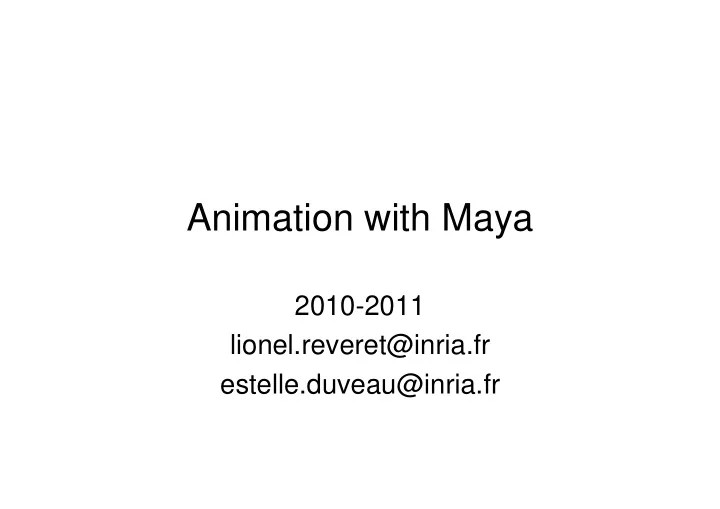

Animation with Maya 2010-2011 lionel.reveret@inria.fr estelle.duveau@inria.fr
Basic concepts • Key-frame animation – any attribute is a function of time • Reactive animation – attribute is a function of another attribute • Deformers – Non-linear modification of shape and space • Physical animation – attribute is driven by laws of dynamics ( f =m a )
Key-frame animation 1. Set time (position time slider) 2. Edit attribute (move, rotate, etc) 3. Set key (‘s’ key) 4. Playback 5. Visualize/edit curves with Graph Editor - value and tangents
time Attribut
Reactive animation • Driven-key animation (Animate>Set Driven Key) – Ex: the cube “avoids” the sphere – Sphere is the “driver” – Cube is the “driven”
Translate Z Cube Translate Y Sphere
Deformers • Nonlinear tools – Shape: bend, twist, etc (Deform>Nonlinear) – Space: lattice, wrap, etc • Vertices morphing – Blend shapes • typically for facial animation – Clusters • weights can be edited by “painting”
Character animation • Create a skeleton (Skeleton>Joint Tool) – Create joints chain (end chain with return) – Create a hierarchy (click on parent joint) • Bind a skin (Skin>Bind Skin>Smooth Bind) – “Shape” of the character • Control with IK handle (Skeleton>IK Handle Tool) – Higher level of control
Character example
Physical animation • Specialized menu : Dynamics • Rigid bodies – Motion (inertia, f =m a ) – Collision (contact forces) • Non-rigid bodies – Clothes (mass-spring system) – Fluids (particles system, Navier-Stokes)
Physical animation Simple example 1. Create a scene 2. Create gravity field (Fields menu) 3. Ball => set to Active Rigid bodies 4. Planes => set to Passive Rigid bodies (Soft/Rigid bodies menu) 5. Bind field and Active Rigid body (Window>Relationships Editors>Dynamic) 6. Bake simulation => set keyframes (Edit>Keys>Bake Simulation)
Recommend
More recommend